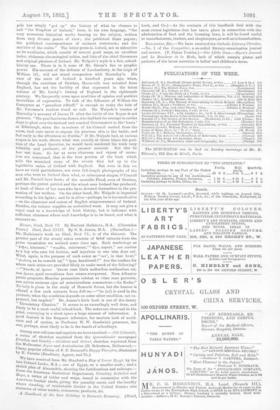Homer, Iliad, Book VI. By Herbert Hailstone, MA. (Clarendon Press.)
Iliad, Book XVIII. By S. R. James, M.A. (Macmillan.)— Mr. Hailstone's work on Iliad, Book VI., is of the thinnest. The greater part of the scanty notes consists of brief extracts from the prose translation we noticed some time ago. Such renderings as " &len, kinsmen," " riaaiSa, outermost," Otkiv, aspect," are useless to a boy who uses his lexicon, and injurious to one who does not. What, again, is the purpose of such notes as "TOT', in that hour," " avaliera, as he cometh up," " tp7a, handiwork P" Are the readers for whom such notes are provided likely to make much of the following P —"'Eretk al. b'pipep. 'Eiretile cum Blois melioribus scribentlum est, non 1;pipev, quod recentiores fore omnes rceeperunt. Nam Adrastus pretio proposito Menelao persuadcre volebat ut vitae suae parceret, non autem animum ojus ad misericordiam commovere.—La Roche." No help is given in the study of Homeric forms, but the learner is offered a few such extracts from Jeff as,—"Ae (K) is used in the protasis, when the condition depends on some other condition, not ex- pressed, but implied." Mr. James's little book is ono of the dainty " Elementary Classics." It seems to us exceedingly well done, and likely to be a most useful school-book. The notes are clear and to the Point, conveying in a short space a large amount of information. A good. feature is the frequent reference, for matters both of accid- ence and of syntax, to Professor W. W. Goodwin's grammar, the one, perhaps, most likely to be in the hands of schoolboys.






























 Previous page
Previous page